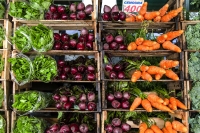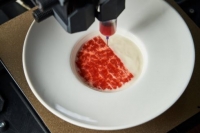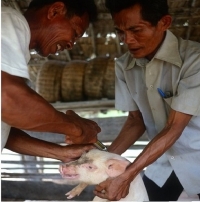News

06/09/2023
Last week FAO concluded a six-month assessment of Kenya’s food control system with a final workshop in Nairobi where high-level executives endorsed the recommendations of the final report and committed to implementing its strategic plan. The assessment is part of "Strengthening of Capacities and Governance in Food and Phytosanitary Control,” a 5-million-euro project funded by the European Union which began in November 2022 to provide technical support and work with Competent Authorities and other leading institutions in 11 Common Market for Eastern and Southern Africa (COMESA) Member Countries. The project is designed to build up capabilities, strengthen governance and improve...

06/09/2023
On 21 September 2023, a side event on cell-based food will take place in Rome, Italy, during the 11th session of the FAO/WHO Coordinating Committee for the Near East (CCNE11). During the side event each country will have the opportunity to be part of the discussion, share information about national regulatory situations concerning cell-based food and shape the global perspective on this topic.
To participate in the discussion session during the side event, the presenter speaking for his/her delegation is invited to respond to three questions on the online form. Speakers are invited to use the form to structure their...

06/09/2023
Fresh fruits and vegetables contaminated with foodborne pathogens (bacteria, viruses, protozoa, helminths, etc.) have resulted in numerous outbreaks of foodborne illness, made headlines and caused trade disruptions around the world. To better understand these hazards, and how to prevent and mitigate the risks, FAO and WHO convened a meeting of scientific experts to identify and evaluate commodity-specific interventions used to reduce the risk of microbiological hazards in fresh fruit and vegetable production – from primary production to post-harvest activities, transportation, point of sale and preparation for consumption. A new report is now available and provides guidance, taking into consideration the...

23/08/2023
FAO and WHO have noted a record high number of food safety incidents in the newly released International Food Safety Authorities Network (INFOSAN) activity report for the two-year period, 2020-2021. During that time, the INFOSAN Secretariat responded to 375 international food safety events, nearly twice the number, 162, in 2018-2019 and the highest number since the Network was established in 2004. During these events, the INFOSAN Secretariat facilitated communication, connecting Members and ensuring access to essential information, such as distribution details of implicated products to their countries and from their countries. The support provided by the Secretariat also helped authorities...

11/08/2023
Last week FAO concluded a nine-month assessment of Comoros’s food control system with a final workshop in the city of Ngazidja where high level executives endorsed the recommendations of the final report and committed to implementing its strategic plan. The assessment is part of "Strengthening of Capacities and Governance in Food and Phytosanitary Control,” a 5-million-euro project funded by the European Union which began in November 2022 to provide technical support and work with Competent Authorities and other leading institutions in 11 Common Market for Eastern and Southern Africa (COMESA) Member Countries. The project is designed to build up capabilities,...

10/08/2023
We had a conversation with Sarah Brunel, Implementation and Facilitation Unit Lead at the IPPC Secretariat, who is working on an FAO project that has two components: promoting food safety and plant health. While most of our questions focused on the project, first we heard a bit about her story and where she comes from.
Sarah Brunel: I am from the south of France and have always had a passion for plants. For this reason, I chose to become an agricultural engineer. My first job was in the south of France working on invasive alien plants from an...

03/08/2023
Cell-based food developers, producers of input materials and those who use precision fermentation to produce food products can apply to the recently issued call to present their original products in Shanghai, China.
In collaboration with the China National Center for Food Safety Risk Assessment (CFSA), FAO will hold a stakeholder roundtable meeting on cell-based food production and precision fermentation on 6 November 2023 in Shanghai, China.
A call for presenters is now open, and the selected presenters will meet fellow producers from various parts of the world to discuss the latest developments in the area of cell-based food production and precision...

24/07/2023
Food and Agriculture Organization of the United Nations (FAO), in collaboration with the Government of Israel held a stakeholder meeting inviting researchers and developers of cell-based foods and their input materials in September 2022. Cell-based food production involves culturing cells isolated from animals to develop products such as meat, poultry, aquatic products, dairy and eggs. Currently more than 100 companies around the world are said to develop a wide range of cell-based foods using variety of different production methods.
The comprehensive report “Cell-based food: its safety and its future role” summarizing the results of the stakeholder meeting has been...

19/07/2023
A new FAO publication sheds light on the economic concerns associated with foodborne antimicrobial resistance (AMR). According to Jeffrey LeJeune, FAO Food Safety Officer, antimicrobial resistance not only increases healthcare expenses but also affects the overall costs of food production.
The public health impact of AMR, the direct cause of 1.27 million deaths globally each year, is often cited. However, there are other less recognized negative societal impacts of AMR. “Antimicrobial resistance is a threat to sustainable food systems, economic growth, and the future of our planet,” said LeJeune.
The publication highlights the economic concerns and costs associated with...

14/07/2023
Today the Joint FAO/WHO Expert Committee on Food Additives (JECFA) published its summary report of the 96th meeting. The scientific experts gathered to Geneva from 27 June to 6 July to look into the safety of use of aspartame and fifteen flavourings when used in food as food additives.
For all substances, JECFA performed a comprehensive risk assessment, which is a four-step scientific process that includes hazard identification, hazard characterization, dietary exposure assessment and risk characterization. Based on that scientific process, the Committee considered related hazards that might be attributable to aspartame and to the flavouring substances.
The Committee re-evaluated aspartame and...
Stay up to date and connect to our RSS feed!
